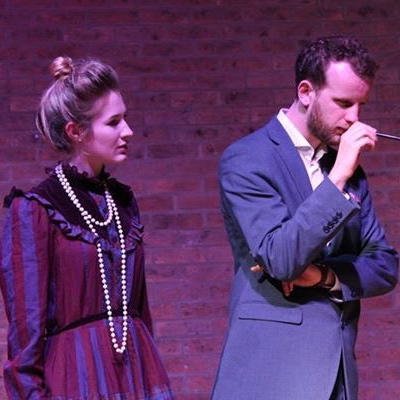 WORD SEARCH: Can you solve Allan Rae's classical music word search puzzles? We're currently publishing one per month.
WORD SEARCH: Can you solve Allan Rae's classical music word search puzzles? We're currently publishing one per month.
Myths and Modernity
GIUSEPPE PENNISI sends his first report
from the 2019 Salzburg Festival
The 2019 Summer Festival in Salzburg (20 July-31 August) has as its unifying theme the modernity of myths staged in ancient theatre. Hofmannsthal defined them as a magic mirror: myths from over two thousand years ago raise questions that we are trying to answer about human existence, war, sacrifice, murder, penalties, repentance and redemption.
Oedipe is George Enescu's only work for the theatre; he worked for over twenty years on a libretto by French poet Edmond Fleg. It is also the only musical work based on not just Sophocles' Oedipus Rex and Oedipus at Colonus but also on less known ancient Greek poems about the birth of the protagonist scarred by inexorable fate. The opera has been relatively forgotten because it paints very articulately a picture of Oedipus' life path (and of humanity) until the final catharsis and forgiveness. (Unlike in Sophocles' tragedies, Enescu's Oedipe regains his sight, humbling himself before God.) The work is founded on a premise far from Sophocles. In reply to this question by the Sphinx: 'who is more powerful and bigger than destiny?', Oedipus replies: 'man', by adjusting, however, his answer, saying that 'man is more powerful than destiny, but is not greater'. For Enescu, 'destiny' is God: he was a believer and practitioner of the Romanian Orthodox Church. The work is thus soaked in philosophy and religion.
In the score of Oedipe, on the one hand, there is the impact of French training on Enescu, a pupil of Gabriel Fauré, and mainly the influence of Darius Milhaud's choral works. There are also echoes of Richard Strauss, Karol Szymanowski and Romanian folk melodies, especially those like the doina and cîntec lung. All these ingredients melt together admirably in writing which is, at the same time, very personal and unique. Ingo Metzmacher's rendering of the score is superb, especially for the richness of tonal details, breadth of sound, attention to solo moments (for flute, and for the two horns), support to opera singers, and attention to the short dialogue at the end of the third act. To give more stereophonic effects, the flute is in one of the boxes carved into the rock of the Felsenreitschule, a small ensemble - one of the three harps, a flute, two horns - and part of the chorus are on a balcony on the left side of the hall, and the choir is frequently offstage. The listener is surrounded by music while the drama of Oedipe (as well as of humanity) is unfolding. Christopher Maltman excels among the protagonists; his voice ranges from airy, melodic, declamatory singing to sprechgesang.
John Tomlinson in the role of Tiresias and David Steffens in that of the High Priest are both vocally imposing. Amongst the women's voices, I would have preferred a sphinx (Eve-Maud Hubeaux) and a Jocasta (Anaïk Morel) with a lower register; Chiara Skerath was a perfect Antigone. All the principal singers displayed good diction (in the French language desired by Fleg and Enescu). The same cannot be said about the many secondary parts.
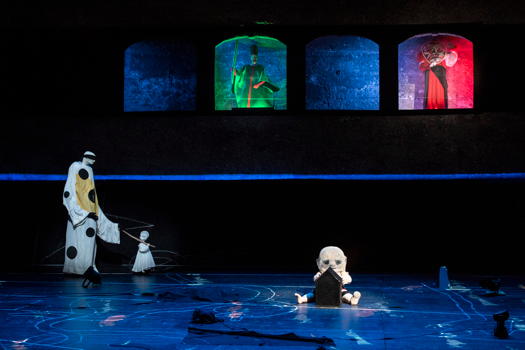
John Tomlinson as Tiresias, David Steffens as the Grand Priest, Katha Platz as Baby Oedipe and Brian Mulligan as Creon in Enescu's Oedipe at the Salzburg Festival. Photo © 2019 Monika Rittershaus
Staging, set, costumes and lighting have been entrusted to Achim Freyer, an eighty-five-year-old veteran of the German theatre and visual arts. In line with the festival's basic concept about the perennial meaning of myth, Freyer has designed an abstract and timeless staging in which the protagonist, a boxer, fights with characters who often emerge from the antlers carved into the rock.
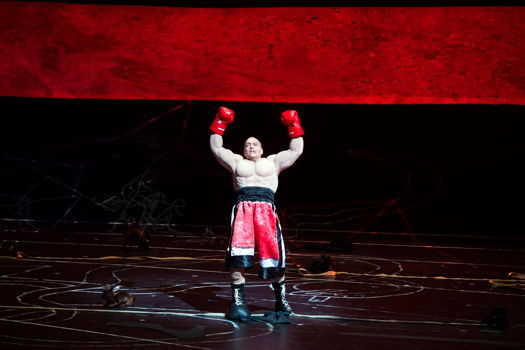
Christopher Maltman in the title role of Enescu's Oedipe at the Salzburg Festival. Photo © 2019 Monika Rittershaus
Sometimes, Freyer loads the staging with too many symbols. Such a staging is, no doubt, controversial. On the evening of 17 August 2019, Freyer was greeted with ovations at the curtain calls, when he showed up with the rest of the cast. I was spellbound throughout the performance.
Alcina is linked indirectly to Greek mythology. It is one of Handel's works inspired by Ariosto's Orlando Furioso, although the story of the sorceress Alcina, who transforms her lovers into fauna and flora, has connections with myths such as that of Circe. In baroque operas such as Alcina, Jürgen Schläder correctly argues that what counts is not the fairytale structure made of enchanted castles and wonderful fountains, because 'the message is the psychological game it conveys' to the audience. This inner life attracts today's audiences, especially the youngsters, to a Baroque theatre that flourished more than two hundred years ago. The 1735 Alcina is one of Handel's mature works with a complex interweaving of spells, cheating, battles and hunts, with the insertion of ballets. At that time, an outstanding voice cast was planned with the castrato Giovanni Carestini for the role of the hero Ruggiero.
The Salzburg production was the flagship title of the Whitsun Festival in June 2019 when it was much discussed in the press. It was a big hit then. I attended the last performance this year in Salzburg's Haus für Mozart on 18 August: at the end, after a four-hour performance (with some cuts) there was an explosion of fifteen minutes of applause and ovations for the whole company. Cecilia Bartoli and Damiano Michieletto's creative team - Paolo Fantin for sets, Agostino Cavalca for costumes and Alessandro Carletti for lighting - seem to follow Jürgen Schläder by the letter. There are no forests, hunting or complex stage machinery: the opera is an inner journey towards aging and loneliness.
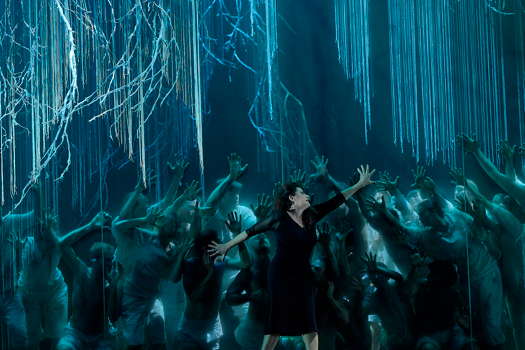
Cecilia Bartoli in the title role of Handel's Alcina with dancers and members of the chorus at the Salzburg Festival. Photo © 2019 Matthias Horn
The story took place in a large twentieth century hotel. Alcina's lovers were not turned into animals and trees but into stones. Alcina (Cecilia Bartoli) sang the first aria as a middle-aged woman in a mink coat. We understood immediately that she was a 'Venus in mink' in the past and that now she was on a sunset boulevard. Ruggiero - Philippe Jaroussky, who played the same role in Aix in 2015 - took the part of her last lover. Bradamante - Kristina Hammarström, featuring a large vocal and dramaturgical ability - was his betrothed; she attempted to get him back. To enter Alcina's realm, she was disguised as a young man, Ricciardo, who became the object of desire of Morgana, Alcina's sister, sung by Sandrine Piau in full swing. Oronte (Christoph Strehl) and Melisso (Alastair Miles) provided a counterpoint to the unravelling of an action depicting aging and the progressive isolation of the protagonist. Les Musiciens du Prince-Monaco, led by Gianluca Capuano, accompanied, on period instruments, this work focused primarily on voices. Staging and dramaturgy were in harmony with the festival's purpose of showing the everlasting relevance of myth.
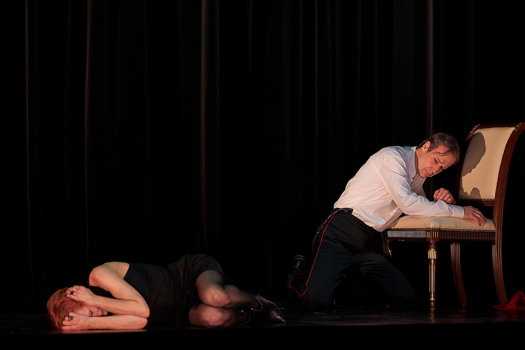
Sandrine Piau as Morgana and Christoph Strehl as Oronte in Handel's Alcina at the Salzburg Festival. Photo © 2019 Matthias Horn
Médée by Luigi Cherubini, seen on 19 August 2019 in Salzburg's Grosses Festspielhaus, is directly linked to both the Greek myth and to classical French theater. In the early decades of the nineteenth century, the opera was beloved by the audience and, more significantly, by composers such as Beethoven, Schubert and Wagner. Then, it disappeared until turning up again in programs in Germany in 1855. The German edition was adapted by Franz Lachner with the dialogues turned into accompanied recitatives. After another long silence, it emerged again, in Italian rhythmic translation, with Maria Callas starring in 1953 at the Florence May Festival. Since then, it is mostly considered an Italian opera; I remember an Italian production in Toulouse about twelve years ago.
At the Salzburg Festival, a philological critical edition would have been desirable. The production, a joint venture with Poland's National Opera, is sung in French (though the diction by the singers leaves much to be desired), but it lacks the dialogues. The 'melologue' of the second act is the sung version prepared to meet public taste (but it is less dramatic than the original). The stage direction by Simon Stone sets the plot in present-day Salzburg (as seen in the videos and movie clips) and turns it into a story of sex, nasty divorce and blood.
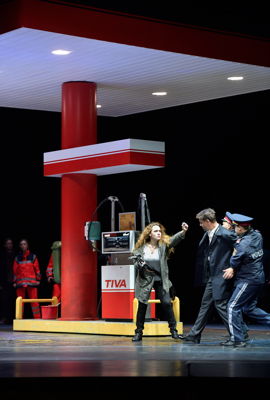
Elena Stikhina as Medea and Pavel Cernoch as Jason with members of the ensemble in Cherubini's Médée at the Salzburg Festival. Photo © 2019 Thomas Aurin
It misses two key points of the myth: the difference of Medea from the people of Corinth and her belonging to another people (by ethnicity, beliefs and values); and the role of Créon as guardian of the established law and order.
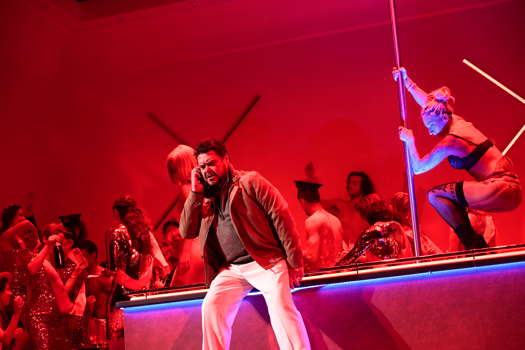
Vitalij Kowaljow as Creon in Cherubini's Médée at the Salzburg Festival. Photo © 2019 Thomas Aurin
Cherubini's sumptuous score - the Wiener Philharmoniker is conducted by Thomas Hengelbrock - does not fit this dramaturgy. What happens on stage clashes with the music. The women singers, especially Elena Stikhina (Médée) and Rosa Feola (Dircé) were very good.
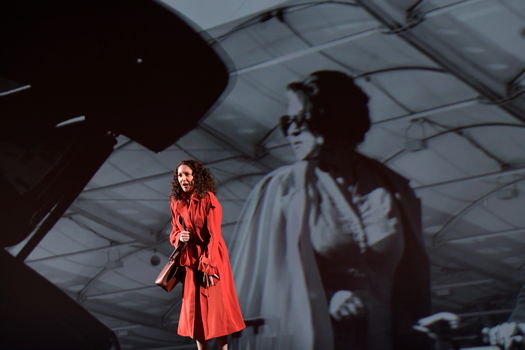
Rosa Feola as Dirce in Cherubini's Médée at the Salzburg Festival. Photo © 2019 Thomas Aurin
Vitalij Kowaljow was an imposing Créon, and Pavel Černoch was good as Jason.
Copyright © 25 August 2019
Giuseppe Pennisi,
Rome, Italy



